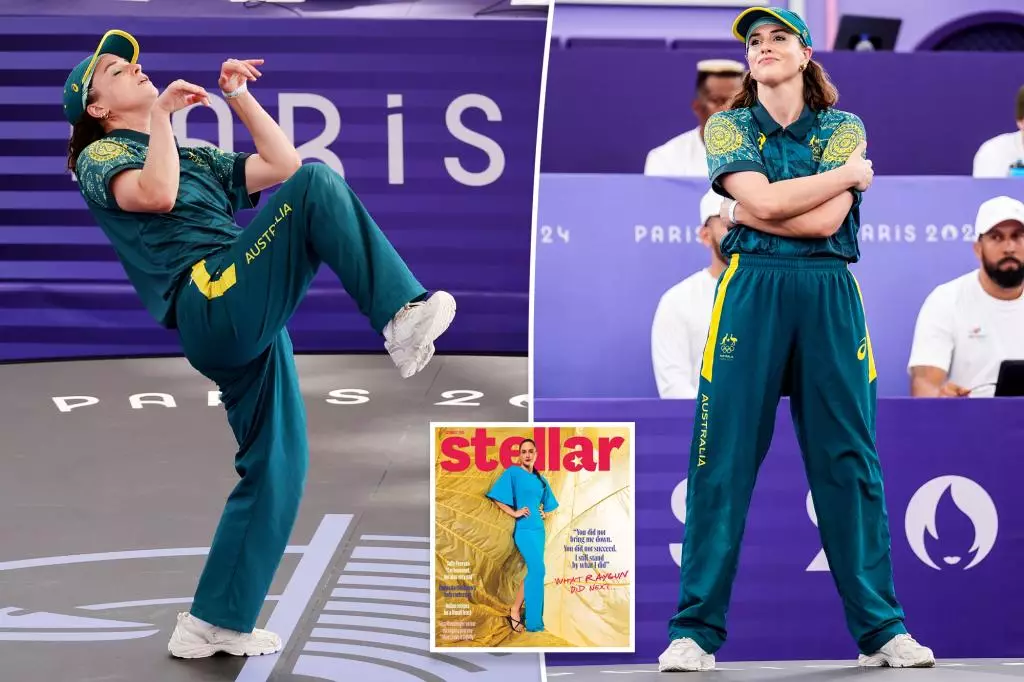Rachael Gunn, widely known by her stage name Raygun, recently attracted significant media attention not just for her breakdancing skills but also for her dramatic image rebranding. In a bold move during her Stellar magazine cover shoot, she swapped her usual green-and-gold tracksuit for an eye-catching electric blue gown that exuded glamour. This shift symbolizes a deeper transformation in Gunn’s life, marking a departure from the casual and often criticized persona she has maintained over the years, to one that embraces confidence and sophistication.
Gunn shared glimpses of her magazine shoot with her followers on Instagram, hinting at a more polished and refined image set against a striking yellow backdrop. Her choice of an elegant gown, complete with bell sleeves and stylish black sandals, showcases a side of her artistry that transcends the dance floor. By posing with her hands firmly on her hips, she demonstrated newfound empowerment and self-assurance, challenging societal expectations placed upon women in sports.
Despite the glamorous façade, Gunn’s journey has not been without challenges. The athlete gained viral notoriety during the 2024 Paris Olympics breakdance competition—not for her success, but for her unfavorable performance that led to no points scored. The pressure of representing her country on such a grand platform stirred widespread confusion among viewers and critics alike, amplifying scrutiny and disparaging remarks regarding her techniques, including unconventional maneuvers like the “sprinkler move” and “kangaroo hop.”
This renewed scrutiny forced Gunn into the spotlight, often for the wrong reasons. Her self-defense on social media encapsulated the emotional toll these relentless critiques took on her. In a heartfelt message, she expressed her disappointment and confusion, distilling her experience into succinct words: “I didn’t realize that that would also open the door to so much hate.” Her acknowledgment of the emotional burden of such criticism reveals a raw vulnerability, a sentiment echoed by many athletes battling public perception in the age of social media.
Gunn’s sentiments were echoed by AUSBreak, Australia’s breaking organization, which supported her selection for the Olympics as being based on a “fair and transparent” audition process. This backing is critical, as it underscores the often overshadowed commitment and effort required to achieve peak athletic status. It highlights a pivotal moment in which the dance community and sports organizations must stand as allies to their athletes, promoting understanding and support rather than harsh judgment.
During her candid interview on Australia’s Network 10, Gunn admitted that the backlash had painted a surreal picture of her life, describing it as “a really weird dream.” This articulation of her feelings demonstrates the dissonance between her aspirations and public perception, a reality faced by many public figures. Her choice to limit her exposure to criticisms by avoiding full viewings of her performances signals a deep-seated need for self-protection amidst the noise.
As Gunn takes a step back from competition, she is shifting her focus to the positives that have emerged from her Olympic experience. This pivot reflects not only resilience but also a mature understanding of life’s complexities. She expressed an eagerness to embrace the joy and positive responses she has given to her audience—a vital reminder that every challenge can also yield growth and opportunity for joy.
In a world often clouded by negativity, Gunn’s journey is a testament to self-discovery and the importance of mental health. Her decision to prioritize her well-being over the relentless pursuit of competition showcases her evolution from an athlete seeking validation through scoring to a woman unapologetically owning her narrative.
Rachael Gunn’s experience transcends the world of breakdancing; it speaks to the broader themes of self-acceptance, the challenges of public life, and the importance of surrounding oneself with positivity. As she continues to redefine herself, Gunn’s story will likely inspire not only dancers and athletes but all individuals navigating their unique paths in a world filled with critical voices.

